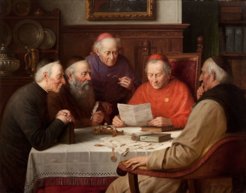Regieren durch Kongregationen. Die römische Kurie: ein komplexer Organismus zwischen Theorien und Praktiken (Mitte des 16. bis Anfang des 20. Jahrhunderts)
Kooperation

Governing by congregations is an international collaboration project funded for the period 2024–2026 within the Trilateral Research Conferences, supported by the Villa Vigoni with the Deutsche Forschungsgemeinschaft (DFG) and the Fondation Maison des sciences de l’homme (FMSH). These initiatives aim to create and support networking between researchers active in Germany, Italy and France in the humanities and social sciences and to promote the use of German, Italian and French as languages of science. The project is directed by Benedetta Albani (mpilhlt), Massimo Carlo Giannini (Università degli Studi di Teramo) and François Jankowiak (Université Paris-Saclay, Sceaux) and involves a group of researchers from German, Italian and French institutions.
The project seeks to investigate the role of the cardinals' congregations of the Roman Curia by questioning traditional historiographical paradigms and proposing new research paths. In particular, it aims to explore the hypothesis of the persistence of a Roman model of governance, which had its roots already in the late Middle Ages, and which spreads, albeit with important caesuras and variations, up to the present day. Especially from the second half of the 16th century onwards (but in some cases even earlier), the new political and religious equilibria, the increased demands on the governance of the Church, the management of information and the new and complex issues that arose from an expanding world generated an increasing amount of work for the Curia. The need to cope with this complexity led to the creation of new permanent bodies, by redefining the roles and tasks of existing temporary commissions, known as 'congregations'. These had the task of providing expert advice to the pontiff-sovereign and of preparing legal procedures. They were also often delegated by the pope to exercise jurisdictional, administrative and governing powers in both the spiritual and temporal spheres.
Until now, scholars have mainly focused on the study of individual congregations, without paying attention to their interconnections. The first objective of the project is therefore to use, for the first time, a comprehensive and integrated approach to the study of the Roman Curia in relation to its various bodies. The project will have a multi-disciplinary approach, capable of integrating the history of law, institutions and ideas with political, social and cultural history in the light of medium- to long-term dynamics. In this way, the categories of centralisation and rationalisation will be questioned and the interpretation of the processes of 'depersonalisation' of the Curia in modern and contemporary times will be reformulated. The work of the research group will be structured around three meetings at Villa Vigoni and various other scientific activities that also involve the Digital Humanities.
